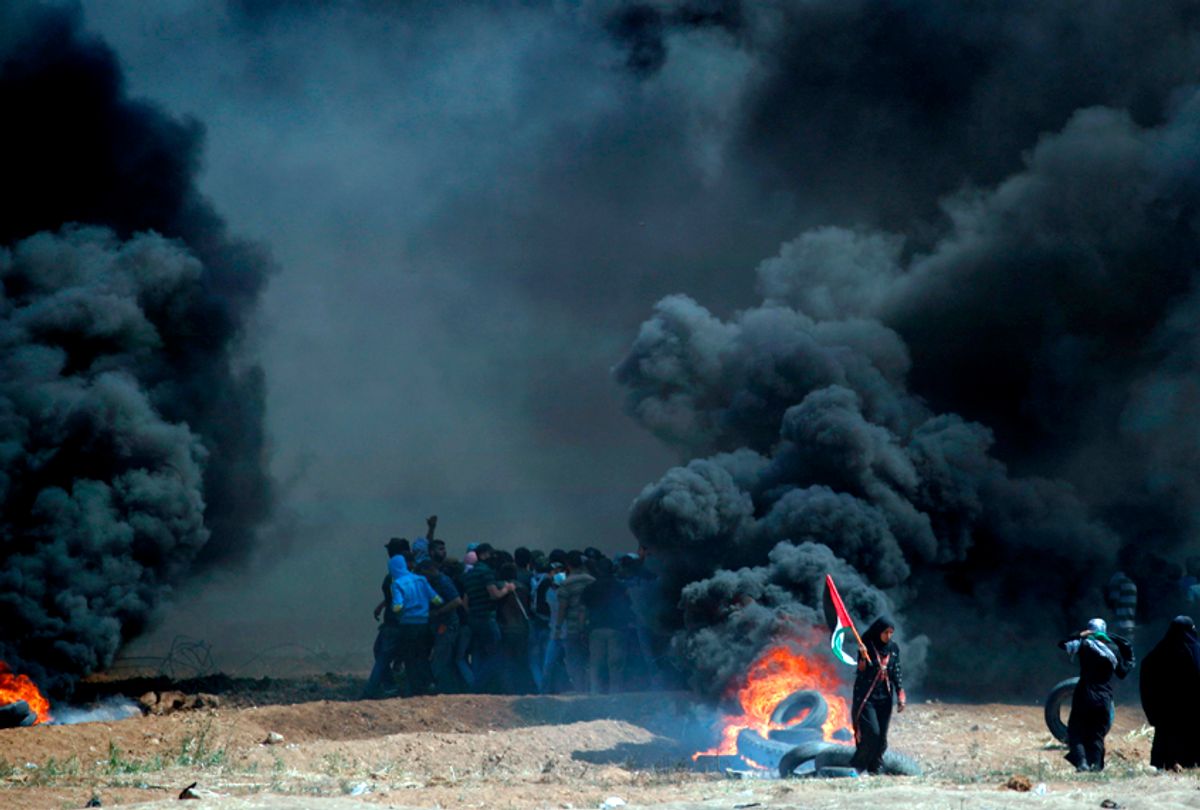Read more articles from the DC Report here.
 The Israeli border with Gaza is aflame with protest marked by more than 120 deaths from Israeli live fire and 2,500 wounded in the last few weeks—at least 60 on May 14—and more to come.
The Israeli border with Gaza is aflame with protest marked by more than 120 deaths from Israeli live fire and 2,500 wounded in the last few weeks—at least 60 on May 14—and more to come.
Israeli military units have been doubled to counter the rising number of protests across the nation and in Jerusalem’s holiest sites.
Declaring Jerusalem as the official capital of Israel and relocating a token embassy there had better be worth it, because all I can see is death, destruction and a swath of protest. It all had been predicted, of course, but somehow, owning up to the campaign pledge to make the move proved more important than the realities on the ground.
It is totally understandable that Palestinians, who are split themselves on dealing with Israel, see this as the final move proving the U.S. anything but a fair broker of people in the region. Where we last left Trump on the Palestinians and Israelis was our president intoning that he saw no advantage of a two-state solution over a “one-state solution,” in which Israelis would have to set up some kind of apartheid state that denied Palestinians the vote.
What have we gained here? Does this make our relationship with Israel closer, which seems impossible? Have we turned our backs collectively on all Palestinians, which seems like a strategic mistake? Have we helped American interests in trade, jobs and economics or with ISIS and terrorism, the main reasons cited by this government for doing anything? How does it make any sense to open the embassy with a U.S. preacher from Dallas, complete with praises to Jesus, who believes that neither Jews nor Muslims can be saved? In fact, why do we need U.S. Christian pastors in a ceremony for a U.S. embassy opening in Jerusalem altogether?
CNN’s explanation has been that the final status of Jerusalem has always been one of the most difficult and sensitive questions in the Israeli-Palestinian conflict. For years, U.S. policy has been to avoid declaring Jerusalem the capital of Israel in the absence of an Israeli-Palestinian peace deal, as the Palestinians also claim Jerusalem as their capital. It was argued that a unilateral decision would break with international consensus and prejudge an issue that was supposed to be left to negotiations.
Recognizing Jerusalem as the capital has also moved the U.S. a big step closer to relocating the embassy from Tel Aviv to Jerusalem, which would be seen as cementing Israeli sovereignty over the city. In some strange bold way, then, declaring Jerusalem the Israeli capital in effect “takes that issue off the board,” Trump says.
At this moment, 85 nations have embassies in Tel Aviv. Now, one has an embassy in Jerusalem.
The Israeli publication Aish.com (Fire), says simply that Jerusalem has no strategic significance. It has no commercial or industrial importance. It is not a cultural center. But the Jerusalem of memory is linked somehow to the current Israelis’ view of themselves as a people:
“Jerusalem is a metaphor for a perfected world, and it gives us perspective on our lives. When Aldous Huxley said, ‘we have each of us our Jerusalem,’ he meant much more than a temporal city of taxi cabs and traffic jams. He meant a vision of what life might be. The vision of life’s promise is one we surrender at our peril, because it gives us the will to live. In exile for two thousand years Jews said ‘Next year in Jerusalem,’ and amidst poverty and oppression they preserved the dream of a world in which love and justice, not power and self-interest, would be the currency men live by.”
Of course, the Palestinians say that, too.
The question at hand then is why now, why did Trump need to move now? Was it just to disrupt the status quo?
Reuters explains that there has long been pressure from pro-Israel politicians in Washington to move the embassy to Jerusalem and Trump made it a signature promise of his 2016 election campaign. The decision was popular with many conservative and evangelical Christians who voted for Trump and Vice President Mike Pence, many of whom support political recognition of Israel’s claim to the city. Trump acted under a 1995 law that requires the U.S. to move its embassy to Jerusalem, but to which other presidents since then—Bill Clinton, George W. Bush and Barack Obama—consistently signed waivers.
In other words, Trump declared Jerusalem the capital simply because he could. In the void of other serious negotiations and political fissures, he decided to thumb his nose toward his predecessors and simply do it.
Now what happens next is on the Trump White House.


Shares